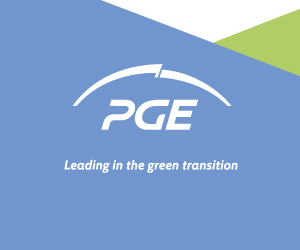“Today we are fighting to be energy secure and our economy to be competitive in Europe and the world,” PGE Polska Grupa Energetyczna CEO Wojciech Dabrowski said in Davos during a panel entitled “The pathway to European energy sovereignty.”
The meeting devoted to Polish-Korean cooperation on the planned construction of the Patnow nuclear power plant was attended by Polish President Andrzej Duda, Deputy Prime Minister, Minister of State Assets Jacek Sasin, South Korea’s Minister of Trade Dukgeun Ahn and representatives of the project partners Johoo Whang, President of Korea’s KHNP, and Marcin Stec, member of the Supervisory Board of ZE PAK.
“There is no doubt among sensible and level-headed experts that it is not possible to use only renewable energy sources without using energy from the atom. It is today a historical necessity, a requirement of the future and an obligation before future generations to provide energy sustainably, but at the same time most stably and securely,”
Polish President Andrzej Duda said in his introduction to the Davos discussion.
On 31 October 2022, the presidents of PGE, ZE PAK and Korea’s KHNP signed a letter of intent to develop a plan to build a nuclear power plant in Patnow, Poland, based on APR1400 technology.
“Thinking responsibly about the future of Poland, we must bet on predictable sources that will provide us with energy security for the next few decades. Hence the involvement of PGE Polska Grupa Energetyczna in this project,”
PGE CEO Wojciech Dąbrowski said in Davos.
As he pointed out, the construction of the Patnow nuclear power plant aims to increase Poland’s energy security and is a response to the energy crisis, high raw materials prices and carbon emission allowances.
“Today, Polish power generation sources are still based on coal, but this is a transitional issue. In the perspective of a dozen years or so, we will be moving away from coal, primarily for economic reasons, as the extraction of this raw material is becoming more and more expensive. Climate policy also imposes huge expenditures on CO2 emissions. This year alone, PGE Polska Grupa Energetyczna will spend more than PLN 20 billion on them. From this comes the need to build low-carbon sources and invest in renewable energy sources. Participation in the nuclear power plant project is precisely the implementation of this policy to produce cheaper energy, and, at the same time, stable and ensuring an acceptable price level for Polish households and sustainable competitiveness of the Polish economy in the world,”
Wojciech Dabrowski added.
Speaking in Davos, Deputy Prime Minister and Minister of State Assets Jacek Sasin noted that the project of PGE, ZE PAK and KHNP is a support for the Polish energy sector in the context of the government’s planned nuclear power plants, the first of which is to use US technology from Westinghouse.
“We are interested in building nuclear energy as quickly and as extensively as possible, because it is to be the foundation of Poland’s energy mix in the future, together with renewable energy, in which we are also very successful. We already have 18 per cent of energy in Poland generated directly from renewable sources and a total of 35 per cent from non- and low-emission sources. However, these are not sources of stable energy, they require stabilisation, and this will be provided by nuclear energy, which will be the main element of the Polish energy mix in the future,”
Deputy Prime Minister and Minister of State Assets Jacek Sasin said in Davos.
In turn, Maciej Stec, representing ZE PAK in the discussion, drew attention to the excellent preparation of the Patnow site for the construction of Poland’s next nuclear power plant.
“Electricity has been produced in Eastern Wielkopolska for 60 years, so there is a high level of social acceptance for power generation, and in addition, an energy transition plan has been adopted in the region related to the upcoming shutdown of the still operating conventional power plants. We have very good geological and technical and seismic conditions. We are at a key hub from which we can already supply the electricity in all directions,”
Maciej Stec of the ZE PAK Supervisory Board said.
The future nuclear power plant will be powered by ARP1400 reactors. These are based on safe Korean technology that has been operating for more than 40 years and is efficient. KHNP is currently the third-largest nuclear power plant operator in the world. As South Korea’s Minister of Trade Dukgeun Ahn emphasised, the country has a good understanding of the challenges facing Poland. He also recalled one of the largest investments in the world being made by KHNP – the Barakah nuclear power plant in the United Arab Emirates. The first three reactors, each with a capacity of 1,400 MW, have already been – within budget and on schedule – commissioned into service, and a fourth is under construction. The Korean experience in nuclear technology was also highlighted by KHNP’s CEO Johoo Whang. As he declared, the company is willing to share this experience with Poland. He stressed that nuclear technology has enabled Korea to build energy security.
The World Economic Forum is an annual meeting of world leaders – politicians, business representatives, and social activists – which takes place in Davos, Switzerland. Among the main topics discussed this year are the economic crisis, the war in Ukraine and climate protection.
The debate can be replayed on the YouTube channel of the Polish House in Davos.

